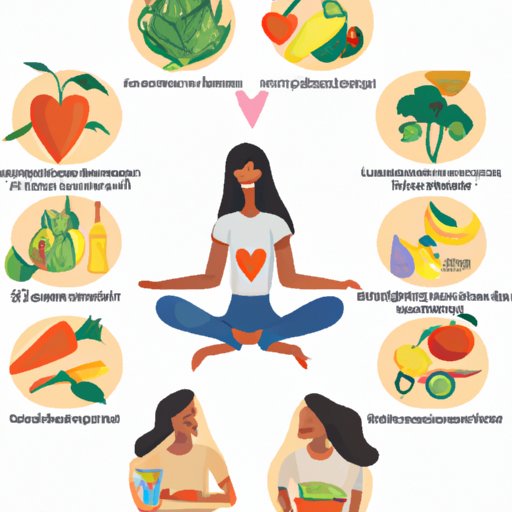Introduction
Having a healthy relationship with food is essential for overall health and wellbeing. It involves developing skills to choose and consume food in a way that nourishes your body while also enjoying the pleasure of eating. In today’s world, however, it can be difficult to create a positive relationship with food due to environmental, social, and psychological factors.
Mindful Eating
Mindful eating is an approach to eating that emphasizes being aware of your physical and emotional feelings towards food. According to registered dietitian nutritionist, Torey Armul, “Mindful eating is about creating a relationship with food that honors the pleasure of eating, respects your body’s internal signals of hunger and fullness, and allows you to make peace with food.”
Benefits of mindful eating include better digestion, improved mental clarity, and increased satisfaction with meals. Additionally, it can help you gain more awareness of your eating habits, which can lead to healthier choices.
Here are some tips for practicing mindful eating:
- Eat slowly and savor each bite.
- Pay attention to the texture, smell, and taste of your food.
- Be mindful of the amount of food you’re consuming.
- Check in with yourself throughout the meal and identify any physical or emotional sensations.
Avoiding Emotional Eating
Emotional eating is the habit of using food to cope with negative emotions such as stress, sadness, boredom, or loneliness. It often leads to overeating and unhealthy choices. A study conducted by the University of Michigan found that individuals who engage in emotional eating are more likely to be overweight or obese compared to those who don’t.
Common causes of emotional eating include low self-esteem, lack of coping skills, and an unhealthy relationship with food. To avoid emotional eating, it is important to recognize the triggers and find alternative ways to cope with negative emotions.
Here are some strategies for avoiding emotional eating:
- Take time to identify your emotions before reaching for food.
- Engage in activities that distract you from cravings, such as reading, exercise, or talking to a friend.
- Practice mindful breathing exercises to reduce stress levels.
- Keep a journal to track your cravings and the emotions associated with them.
Eating When Hungry
One of the most important aspects of having a healthy relationship with food is learning to recognize when your body needs nourishment. This means eating only when you’re hungry, rather than out of boredom or stress. It also means stopping when you’re full, rather than continuing to eat past the point of satiety.
Recognizing physical cues of hunger can be difficult for some people. Common signs include feeling lightheaded, irritable, or unfocused. If you find yourself in this situation, try drinking a glass of water and waiting 15 minutes to see if the sensation passes. If not, it’s likely that your body is telling you it needs nourishment.
If you’re bored or stressed, there are other alternatives to eating. Try going for a walk, taking a hot bath, or listening to music. You can also practice mindful breathing exercises or reach out to a friend for support.
Enjoyment of Foods You Love
It’s important to remember that food should be enjoyable. Allowing yourself to indulge in moderation can help prevent feelings of deprivation and guilt. Finding the balance between “good” and “bad” foods can help create a healthy relationship with food.
For example, if you’re craving something sweet, try making a healthier version of your favorite dessert. This could mean swapping out processed sugar for natural sweeteners like honey or maple syrup, or using whole grain flour instead of white flour. This way, you can still enjoy the foods you love without compromising your health.
Incorporating Healthy Eating Habits
Making gradual changes in your diet is key to developing a healthy relationship with food. Start by setting realistic goals and breaking them down into smaller, achievable steps. For example, if your goal is to eat more vegetables, start by adding one serving of vegetables to each meal.
Creating a healthy meal plan can also help you stay on track. Choose nutritious foods that you enjoy and be sure to include a variety of fruits, vegetables, lean proteins, and whole grains. Planning ahead will help you avoid making unhealthy decisions on the go.
Seeking Professional Help
If you’re struggling to develop a healthy relationship with food, it may be helpful to seek professional help. A qualified healthcare professional can provide personalized guidance and support to help you reach your goals.
When to seek help depends on the individual. Some people may benefit from working with a registered dietitian nutritionist, while others may need to see a therapist to address underlying issues. There are also online programs available to help you learn how to make healthier food choices.
Conclusion
Having a healthy relationship with food is important for overall health and wellbeing. Mindful eating, avoiding emotional eating, and incorporating healthy habits can all help create a positive relationship with food. Additionally, seeking professional help can be beneficial if needed.
By following these tips, you can begin to establish a healthy relationship with food that honors your body and nourishes your mind. With patience and dedication, you can create lasting changes that will benefit your overall health.
(Note: Is this article not meeting your expectations? Do you have knowledge or insights to share? Unlock new opportunities and expand your reach by joining our authors team. Click Registration to join us and share your expertise with our readers.)
